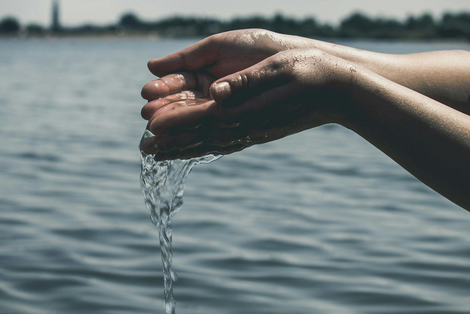Earth is known as the "blue planet" – around 71% of its surface is covered by water. For cosmonauts in space, water has a special significance: not only is it essential for life, it is also very rare. At the same time, the view of the earth from space makes us realise how precious the earth is – a perspective that inspires awe. Alongside earth, air and fire, water is one of the four elements needed for life. The proportion of water in the human body is around 60%. Fruit and vegetables consist of up to 95% water: a cucumber, for example, contains as much as 97% water and lettuce 95% [1]. These figures show that water is the main component of living organisms and thus emphasise the statement: "Water is life".
The global water situation is becoming increasingly unbalanced, which is hampering sustainable development: groundwater levels are falling, droughts are increasing and, at the same time, flooding is on the rise. For several years now, the World Economic Forum's (WEF) Global Risks Reports have categorised water crises as one of the greatest global risks. In second place are the loss of biodiversity and the collapse of ecosystems, which are also ultimately linked to water [2].
Of the total amount of water worldwide, only around 2.5% is fresh water, of which only 0.6% is usable for humans and nature. This proportion is constantly decreasing due to increasing pollution. The water situation therefore affects everyone – not only because water is the basis for all life processes, but also because, in addition to visible changes such as water disasters and water shortages, invisible changes are increasingly becoming noticeable for everyone, such as declining water quality. Every year, around one million people die from water-borne diseases such as diarrhoea. The main cause is contaminated drinking water due to inadequate wastewater disposal, a lack of sanitary infrastructure or uncontrolled waste disposal, which pollutes the groundwater [2].
However, even in countries with well-monitored drinking water systems, residues such as microplastic particles or so-called per- and polyfluoroalkyl substances (PFAS) are increasingly being detected. These are industrial chemicals that are used for textiles, food packaging, but also for high-tech products such as semiconductors. They are also known as forever chemicals because they are long-lasting and water and grease repellent. Once they have been released into the environment, they are very difficult to remove – if at all [2]. Pesticide and nitrate pollution is also on the rise. An analysis of nitrate pollution in groundwater from 292 regions worldwide showed that in 49 regions more than a quarter of the samples exceeded the WHO limit value of 50 mg/l nitrate [4]. The more carelessly water is used, the more residues accumulate in it – and the more the quality deteriorates. Water quality can therefore be seen as a reflection of the way we live.
In order to ensure that clean water is available to everyone in the future, goals for better water management have been defined at a political level. For example, as part of the 17 Sustainable Development Goals of the United Nations 2030 Agenda (SDGs), all people should have access to safe drinking water and adequate sanitation and hygiene [5]. Strategies for more efficient water use have also been adopted and the population is being called upon to pay attention to their personal water footprint.
However, in order to effectively change the cause of the water problem, water must be viewed differently: water has the special property of only becoming noticeable when there is a failure. This manifests itself, for example, in the quantity – too much, too little – and in the quality. However, water does not "shout", but remains silent – and is therefore often taken for granted. What is needed is a mindful approach to water, a new focus on it and a new awareness of its true value. This is exactly what biodynamic agriculture is all about: for example, the build-up of humus in the soil is promoted, which allows the soil to absorb and store water. In addition, no synthetic pesticides are used so that the groundwater is not polluted. This approach allows water to return to its pure form and true quality and serve life.
Bibliography
[1] Hennig JS: "Wasserreiche Lebensmittel - Warum Wasser essen sich lohnt" foodspring; https://www.foodspring.de/magazine/wasserreiche-lebensmittel retrieved on 13/05/2025
[2] Eid U (2025): "Water! The global perspective." Ernährungs-Umschau; 72(4): M248-54. DOI: 10.4455/eu.2025.017
[3] Schneider I (2025): "Water for human nutrition - where are the differences?" Ernährungs-Umschau; 72(4): M255-61. DOI: 10.4455/eu.2025.018
[4] Abascal E, Gómez-Coma L, Ortiz I, Ortiz A (2022): "Global diagnosis of nitrate pollution in groundwater and review of removal technologies" Science of The Total Environment 810(152233) doi.org/10.1016/j.scitotenv.2021.152233
[5] Global goals: "the 17 goals" https://www.globalgoals.org/goals/ retrieved on 26/05/2025
